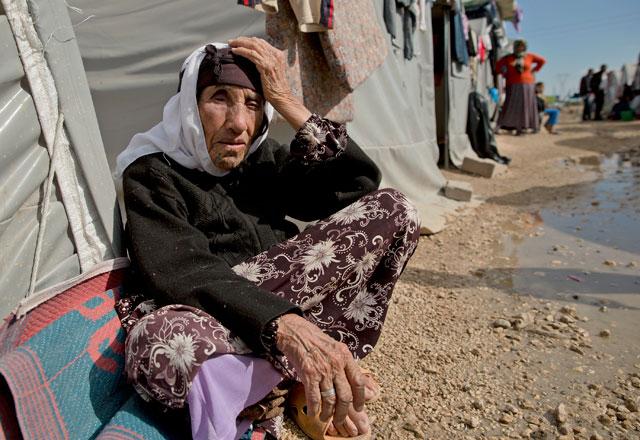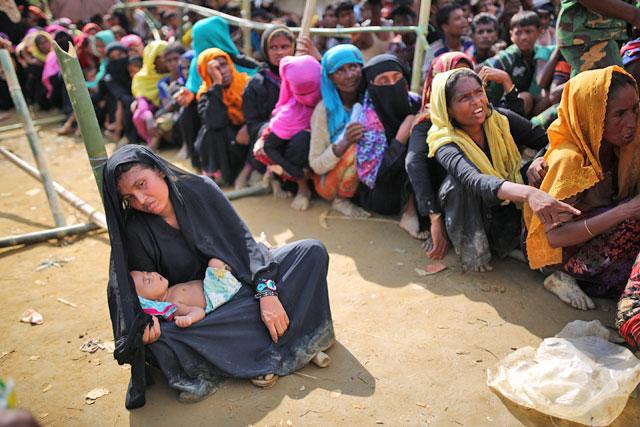You are here
‘World must end cancer of statelessness’
By Reuters - Nov 04,2014 - Last updated at Nov 04,2014

LONDON — The tragic plight of 10 million stateless people is a "cancer" that must be excised, a top UN official said on Tuesday after launching an ambitious campaign to end the crisis in a decade.
With no nationality, stateless people are denied the basic rights most people take for granted. Many live in destitution and are at risk of exploitation including slavery.
"To be stateless is to be tortured every day. It's a form of psychological torture that is permanent," UN refugee chief Antonio Guterres told the Thomson Reuters Foundation in an interview.
He added it would be "deeply unethical" to perpetuate the suffering any longer.
Key countries the UN refugee agency (UNHCR) will be focusing on include Myanmar, where more than 1 million ethnic Rohingya are denied citizenship, Ivory Coast, where large-scale statelessness helped fuel years of civil war, and Dominican Republic, where an estimated 210,000 people, mostly of Haitian descent, are living in limbo.
Guterres warned there was also a risk that the Syrian war could create a new stateless crisis. More than 50,000 babies have been born to Syrian refugee women in exile, but 70 per cent of births have not been registered.
The situation is complicated by the fact that many refugee households are headed by women, but Syria is one of 27 countries which does not let women pass down their nationality.
"If you are a Syrian woman expecting a child and if your husband has been killed or disappeared in the conflict or is not known, according to Syrian legislation that child is not Syrian. So there is a real risk of statelessness," Guterres said.
He said the UNHCR was working with countries like Lebanon and Jordan which are hosting refugees to simplify birth registration.
Guterres said statelessness was the most forgotten human rights issue partly because most people could not imagine having no nationality.
"We think it's high time for the world to [realise] that there is still this cancer to be extracted," he said.
"Imagine that tomorrow you wake up and all of a sudden you discover that you have no driver's licence, no credit cards, no other ID document, that you have no social security and no job, that your children cannot go to public school, and that you are not accepted in a public hospital that the day you die you won't even get a death certificate.
"We have testimonies from stateless people saying things as horrible as, 'We feel that we are like wild animals that we are totally lost.' And this is unacceptable in the 21st century."
‘Terrible rejection’
Guterres said the most desperate people he had met were the Rohingya who live in extreme poverty in northwest Myanmar.
"You are considered in Myanmar — where you have always lived — as an illegal migrant from Bangladesh, but if you move to Bangladesh you are considered an illegal migrant from Myanmar. You feel rejected by everybody. This feeling of rejection — nobody wants me — it's terrible."
The crisis is widely seen as one of the most intractable, but Guterres said discussions between the UNHCR and the Myanmar government were much more open than three years ago.
"This was a complete taboo, now this is something that is actively discussed," he added. "There is still a long way to go, but at least it is no longer a totally blocked issue."
A second focus of the campaign is to improve nationality laws, in particular to ensure all countries allow women to pass their nationality to their children.
The UNHCR will also be pushing countries to fine tune their nationality laws "to ensure nobody falls between the cracks". For example, every country should allow any child born on its territory to acquire nationality rather than be stateless.
Guterres admitted the campaign's 10-year goal was ambitious, but said there had been a recent change in attitudes. He pointed out that 4 million stateless people had acquired a nationality in the last decade with efforts by some countries with large stateless problems, including Ivory Coast and Thailand.
There had also been a rush of countries acceding to the two UN treaties on statelessness and others had got rid of discriminatory nationality laws.
Guterres stressed that resolving statelessness was not only a human rights issue, but vital for stability as large groups of disenfranchised people impacted national security.
"I believe that to eradicate statelessness is indeed a win-win situation for everybody," he said.
Related Articles
GENEVA — Being born with no nationality can cause children irreparable harm, the United Nations said Tuesday, estimating that a stateless ch
DHAKA — Bangladesh Prime Minister Sheikh Hasina headed for the UN General Assembly on Saturday to plead for global help coping with the Rohi
YANGON — Myanmar is committing crimes against humanity in its campaign against Muslim insurgents in Rakhine state, Human Rights Watch said o















